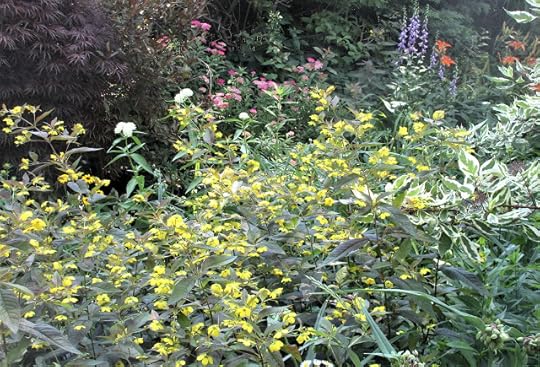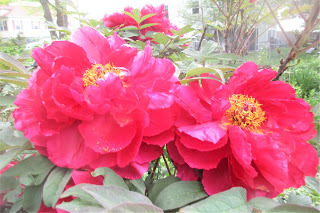Robert Knox's Blog, page 5
September 14, 2021
The Garden of Verse: Wildlife in the Driveway in September's New Poems
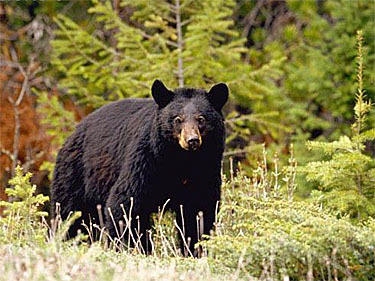
I’m offering three occasional poems in the September 2021 issue of Verse-Virtual. The first of these recounts a rare occasion -- at least I hope it proves rare -- of a wildlife visit to our summer cottage in Berkshire County, Mass.
The two other poems, "When You Are Lost" and "As Times Change" address the sort of things that happen, one way or another on our personal journeys through time and space, rather more often.
Here's the poem about the bear:
The Bear at the Bottom of the Driveway
Not actually the bottom,
but where the blacktop swerves, almost at a right angle
on its leafy way to Mahkeenac Road,
that pleasant artery named for the people replaced
by those who built the road
The trashcan belonging to the house at the driveway’s bend is empty now,
and perhaps our black bear has failed to make its acquaintance
in its more fetchingly odorous state,
as no debris is visible,
but the creature, larger now than when last
I made his acquaintance
at this very swerve in life’s path,
many moons before,
is snorffling contentedly in a wallow of wild roughage
not far from the hard, man-thing container
And wholly visible from the back-end of my car
which I am about to load with inedibles, clothing,laundry, his and her laptop computers and –how could I forget? –
some garbage of our own,
in preparation for imminent departure
Well, old man – or, ‘young fellow’ – we meet again!
We exchange a look,
then each goes back to his business,
mine the popping of the trunk
and the loading of luggage happily not too fragrant
The visitor moves his feeding station a few steps,
to the other side of some thinly-leafed brush,
agreeing to disagree with my disaffection for his presence,
but not doing anything truly about it
Two minutes later, as I bear a second load for the trunk,
a car rolls up the drive and parks in front of the trashcan house,
a mere few feet from the bear, still unambiguously present,
the car blocking my view of the scavenger
When the driver emerges, I call what I believe
to be a salient observation:
“There’s a bear on the other side of your car.”
He responds, “I know.”
Not knowing what else he might know or not know
(is he the house’s owner or a short-term renter?)
I attempt a pitched-voice dialogue at uneasy distance –
the man too far for talking, the bear too close for comfort –
unwilling to take a single step toward to our visitor,
while not entirely clear on the nature of our relations.
To my neighbor I draw attention to the trash can,
implying a preference for its removal.
The other’s replies are brief and unapologetic,
as if waiting for me to advance a quarrel,
a thing I do not easily do, whether an interested bear
is listening or not…
Minutes later, the car loaded for the long trip home,
we roll down the drive to the swerve
and glance up as the man, a woman, and a little girl
lean on the railing of the house’s abbreviated deck,
gazing down in wonder at the bear,
in what appears to be the rapture of the innocents,
as if they have utterly no inkling
that they’re the creatures in our zoo.
To see the other two September poems, see Verse-Virtual
August 16, 2021
Garden of the Seasons: The Abundance That Is Mid-Summer
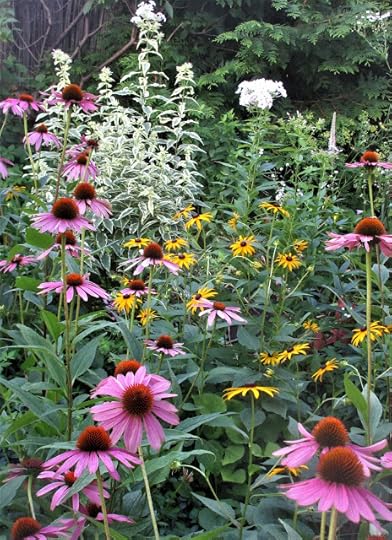
Songs of Home
Songbirds, but also talk-birds
Jays, Cardinals, Finches, Sparrows, Robins,
they pay their morning visits,
late morning by the time I attend
Discussing the weather in
the long, leafy days of July,
best days of the year,
proclaiming – who knows?
Work done. Eggs laid.
Spouse stuck home in the nest,
time for a stroll around the neighborhood
I'm here. I'm cool.
Are you cool?
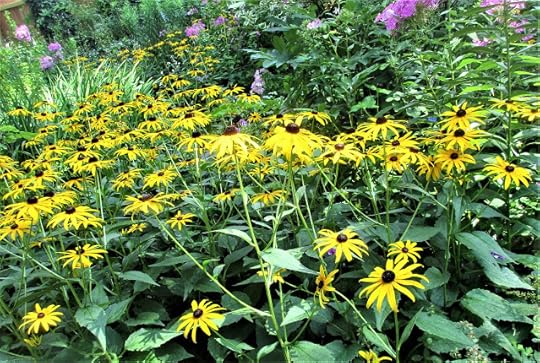
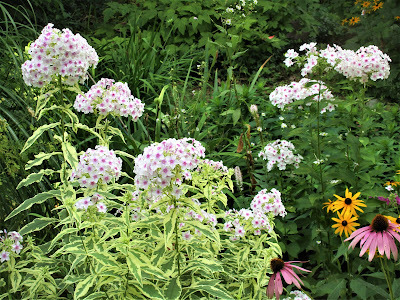
Thinking of the Future
You pull them up,
trim them, cut them short,
rip them from the roots
knowing they will be back again next year,
the ill-placed evergreen expanding its wings to block the sun
The eagerly green perennial oat grass
expanding its borders into whatever's next door
The familiar creature spins its little hope
of a flower, a seed to secure tomorrow-land
The undesired, eagerly fertile, always expansive
big-talker with no sex appeal?
He's everywhere,
demanding to know what you plan to do with his earth
that's any better than he is
Still you keep going
You're finding hope around the next bend –
you have to find it somewhere:
The future.
Did you plant any of that?
And if you did,
is it very, very strong?
August 2, 2021
The Garden of Verse: My Covid Time Poem "News of the Departed" and More New Poems in the August Issue of Verse-Virtual
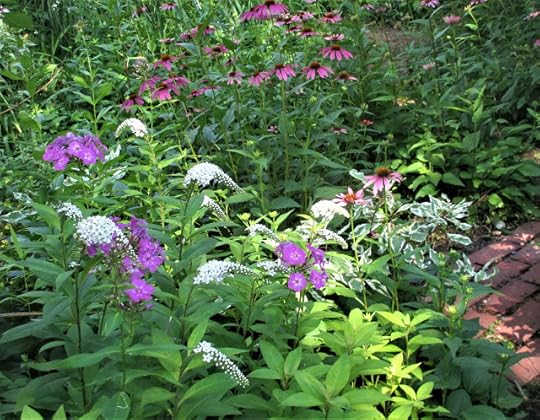
My Covid Year poem "News of the Departed" is up on the August issue of the journal "Better Than Starbucks" -- I don't know if that's a big phrase for the general (or poetry-reading) public, but from now on it works for me. The issue includes work by 105 contributors in a host of categories such as free verse, haikus, formal, experimental and many others.
"News of the Departed" was my attempt to say something about the sorrows and losses so many were suffering during the Covid pandemic (which apparently is not over, so pardon the past tense). It was written during the spring of 2020 when 'life' in nature was returning strongly, as if to reassure us that the Earth was healthy and life would once again continue for us as before. But it would not go on for all of us.
Here's the link
I have new work in the August issue of Verse-Virtual as well. My thanks to editor Jim Lewis for including 3 poems of mine in an issue he describes as featuring "more new voices, and some old familiar ones whose work never fails to impress."
Here's the beginning of my poem
Calendar Days
August feels a little lateYou’d thought that by this latter date
You’d surely have more done
The bees are in the asters
The butterflies are rare
The twilights have a sharper tone
But still more time for fun
September’s songs are mellow
You’re not going back to school
Marigolds are yellow
And resolution is the rule ....
And the first lines of my poem
My Mother Lost Two Houses
My mother lost two houses
It wasn’t hard to do
Two fathers passed away as well
A story sad but likewise true
A story she would later tell
when things – or so it seemed to us –
were mostly going swell ...
To read these poems in full and check out the rest of the issue, here's the link Verse-Virtual August 2021
A few more mid-summer garden pics below:
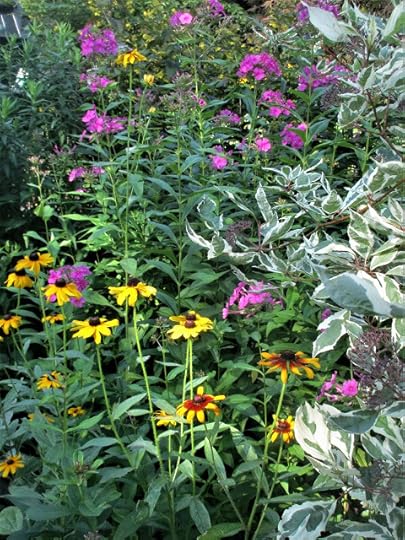
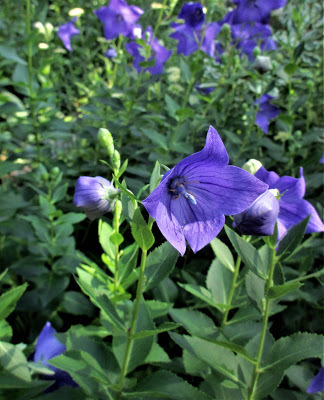
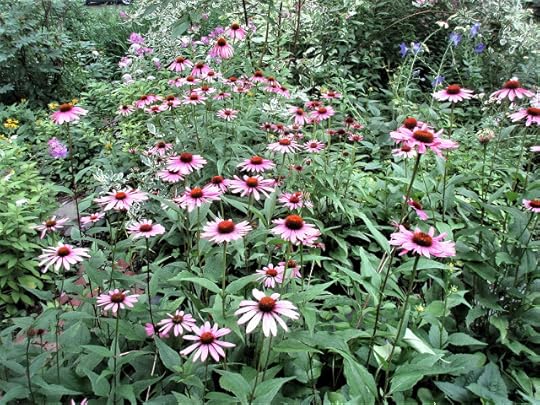
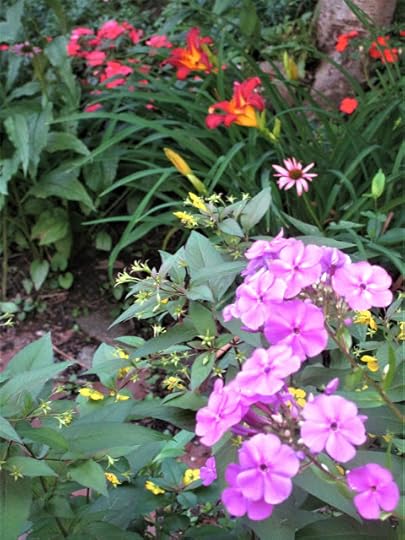
July 24, 2021
The Garden of Verse: Three Poems in an English Journal... It's Like Seeing the Sun in an English Garden
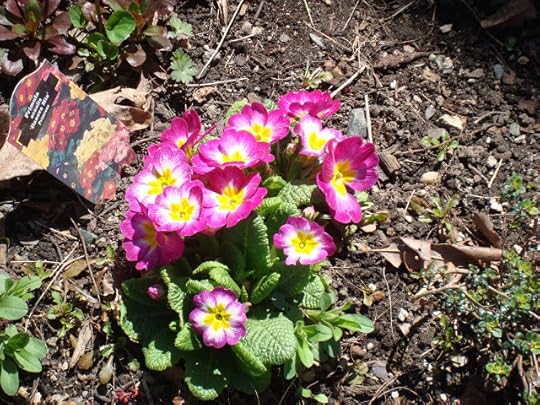
I just received my contributor's copies of the Scissortail Quarterly, which features three of my poems. This issue was actually published in March, in England, but I think my copy got lost in the Covid time mails. My thanks to editor Brian Fuchs for publishing my poems., and then sending more copies. Because this journal publishes on paper but not online, I'm posting one of these poems, a praise song to Spring, below.
You can learn more about the Scissortail Quarterly here. https://scissortailpress.com/quarterly/
Here's the poem:
The Earth Is Like
“It is spring again. The earth is like a child that knows poems by heart” -- Rilke, The Songs of Orpheus, No. 21
The earth is like a younger brother,
who follows his sun around,
copying his ways, rising from the ground each day
who returns from his eternal defeat
to eternal recurrence
Like the child
who refuses to take a nap
when his cankered eyelids are weighted down
with the heavy visors of fatigue
It’s spring again
The earth tu-lips his favorite rhymes
The earth demands to stay up late
to be feted with sweetmeats
and Sugar Pops
The earth is a child who stays home from school
who endlessly sings his favorite ads
who speaks truth to raindrops
who steals cigarettes from sleeping uncles
who plays silly songs from twenty years ago
on devices of his own devising
that only indulgent babysitters know
who hides brother Winter’s favorite toys
and refuses to give them back until Christmas
A child who demands a pet
to stay up late
to eat dandelions and green berries for supper
who demands to know a secret
and hear a brand new story every night
who demands to be heard
In spring the earth demands to be President
that his team always win
that the wind blow only at his back
In spring, the earth is born yesterday
and will live forever
that green berries turn blue, or red,
as required
That old songs will be sat upon his knee
to sing old men back from tired labors
to scrounge among barbs and brambles
and smell only of lilac in May
’
July 20, 2021
The Garden of Verse: New Poems in the Heat of July -- And a Story on a Very Hot Subject
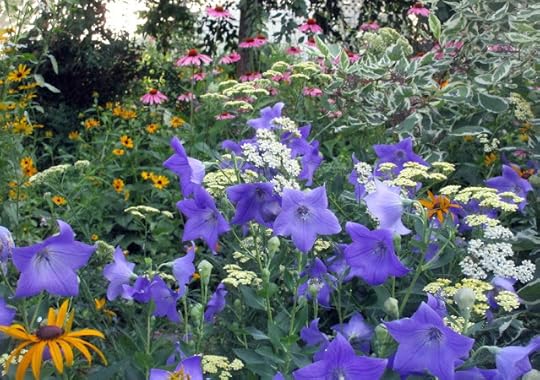
The older I get the more my thoughts drift back to my beginnings. One of three new poems in the July 2021 issue of Verse-Virtual, "I Banged Up the Car" is a poem that reflects on how we express, or fail to express, emotions.
I Banged Up the Car
The tale I am hearing is all too nicey-nicey
Why is everybody crying?
And they keep telling each other that they love each other
as if this somehow were news,
or a message from the gods
My mother and I never once in our lives said
‘I love you’
I never used that word, not once in my young life
spoke the word aloud
until my high school girl friend positively made me say it
(on pain of not getting any)
Say You Love Me
Why?
Just say it. Or I’m going…
I never told my father anything
The word ‘love’ surely never arose in any single conversation
in our lives together,
in part because we never had any conversations
such as those I read in the tales of others
My parents never talked to each other either
(not about anything beyond present exigencies),
at least in the presence of younger ears
I just can’t do all this warm emotional expressiveness
And – crying?
Now that I am old I cry all the time – at movies, at the TV,
over lyrics penned two centuries ago,
and though nobody ever makes any kind of deal about
what I do,
the folks in the tale I’m hearing, both hale and hearty – and young –
keep breaking down
over practically nothing,
which somehow bothers me
Oh, to tell the truth,
Dad and I did have to talk a few times
It was after I banged up his car
Yeah, I did that…
more than once
Also featured in the July Verse-Virtual, "Walking the Loop" is a poem about how hard it is to walk uphill when you're afraid you may be going downhill.
And "I Am Impressed by the Sheer Persistence of Nature" is a poem about trees and how we go on needing them. Here's a link to these two poems; Verse-Virtual July 2021
My thanks to the Eunoia Review for publishing this Covid Year poem. Titled "The Place of Birds," the poem stems from a visit to a nature sanctuary in Philadelphia during the lockdown Christmas of 2020. Here's the link: The Place of Birds
The Eunoia Review also published my short story "The Fire," about a long-ago bonding experience in a group house. Ah, youth.... Here's an excerpt from this story the story:
... I am unconscious in the early light of a summer morning when some kind of heavy, punishing noise begins pulsing through the house. Something (or somebody?) is banging on something somewhere in the house or slamming the ceiling underneath my bedroom floor.
Sleep still wants me back. I try hard to ignore the summons.
But I can’t get back to blessed oblivion for more than a moment or two before the pounding yanks my head awake again. Then stills for a second or two, then starts roaring up again. Pow-pow. Slap-slap. The briefest pause and then a harder Slam!
I have an image of some giant beating a rug. The strongest man in the world, Hercules the Housecleaner whaling a gigantic war mallet against Olympus’s thickest Oriental carpet.
Wham! Wham! Wham!
To read the rest, here's the link: The Fire
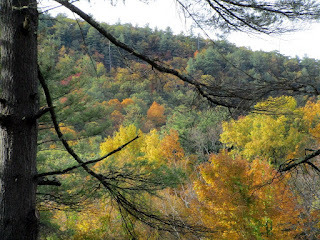
Finally, my poem "What You Will Find in the Woods" is in the latest issue (No. 55) of "The Dawntreader," an English quarterly journal devoted to the theme "of the mystic, landscape, myth, nature, legend, spirituality and love / concern for the environment," in the words of editor Dawn Bauling. The journal publishes only on paper, not online.
Here's the poem:
What You Will Find in the Woods
You will find something.
What you find in the woods
will be different from what anybody else finds
and even if somebody is walking along right beside you,
they will not find what you do,
not even if the one beside you is your lover or
your soul mate.
But on second thought go there alone
and when you find it,
and it finds you,
you will probably wish
to be alone with it.
It takes up a lot of space.
It is, even,
a little scary.
But you will know
it is yours.
To learn more about The Dawntreader see their website here indigodreams.co.uk/the-dawntreader/4563791666
July 19, 2021
The Garden of Verse: My Poem in the Lovely Nature-Centric Journal "The Dawntreader"
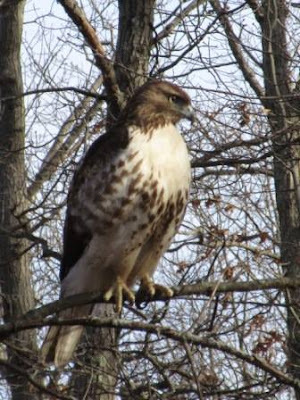
My poem "What You Will Find in the Woods" is in the latest issue (No. 55) of "The Dawntreader," an English quarterly journal devoted to the theme "of the mystic, landscape, myth, nature, legend, spirituality and love / concern for the environment," in the words of editor Dawn Bauling. The journal publishes only on paper, not online. So I'm posting the poem below.
To learn more about The Dawntreader see their website here
The Dawntreader
What You Will Find in the Woods
You will find something.
What you find in the woods
will be different from what anybody else finds
and even if somebody is walking along right beside you,
they will not find what you do,
not even if the one beside you is your lover or
your soul mate.
But on second thought go there alone
and when you find it,
and it finds you,
you will probably wish
to be alone with it.
It takes up a lot of space.
It is, even,
a little scary.
But you will know
it is yours.
June 23, 2021
The Garden of Verse: The Great Egret Knows Who He is... The Poet Recalls How He Began
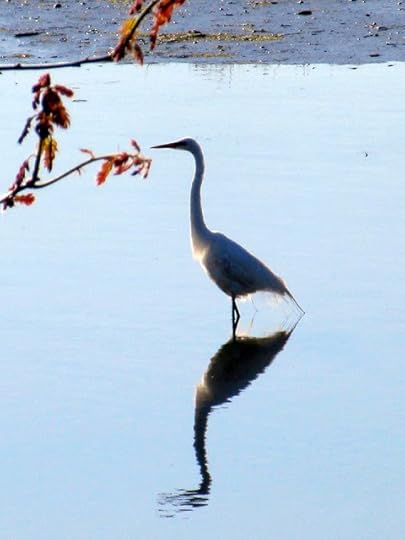
My photo of the Great Egret, who courteously posed for his picture
in an inlet off Boston Harbor, near Quincy's Wollaston Beach. The poem
responding to the photo appeared in the June issue of Verse-Virtual.org.
Here it is:
Great Egret
The name is no exaggeration
A creature made of formal beauty
A head shaped like a woodcutter's wedge
its plane horizontal, no top to its bottom
The angle down the back more shapely
than the angle down the front
Its stance an unearthly walk upon the water,
its twin, a staged imitation –
almost perfect,
but upon inspection
possibly a little better
Its color either white, all colors merged into one,
or a single offering of light on water,
the color of shimmer
Built for the job, or something grander
Shining like an idea in the eye of god
The June issue also includes a poem about some of my earliestchildhood memories. We lived with my grandmother (my mother's mother) in Flushing, Queens, NYC. The poem reports the little disturbances of childhood just as I recall them.
Growing Pains
I am growing
Ever so small at the beginning of things,
yet I am growing
Kissena Park, Flushing, Queens, walking home with Dad
who takes me, after work, to the playground
Freed of my daylong presence, Mom takes a pass
After play time, the swings, perhaps monkey bars,
I am enjoying the freedom of the warm evening on the walk home
when I slip, attempting some show-off gesture
a touch beyond my childish confidence
and fall, cutting my knee on something sharper than mere earth,
my first wounding, by something harder than mere flesh,
though at so long a remove I will never recall what dare I was taking,
what test of my agility
that resulted in a stumble.
“I told you not to do that!” Dad scolds
“Glass,” he reports to Mom. “I told him to watch out for broken glass on the ground.”
“Not too bad,” she replies, seemingly unworried,
a pattern that repeats in my future stumbles,
which grow in severity as years advance
Glass, I think later: a reason for bleeding
Everybody needs a reason for bleeding
I do not feel the wound, at least not in memory,
but the disappointment
of failing to complete that little playful leap,
that stretching of my childish wings
2.
We live in Grandma’s house, the old brownstone
on a numbered street
where the buses go by at night, every night
in the summer dark, and I am exiled from the company of humans
to dwell among the shadows of the darkened bedroom
above the night-clad street.
I hear the muttered exhalations, the squeeze of brakes, opening of doors
Upstairs in the big old house we left behind, so memory insists,
when I was only three –
Is this arrow from the past my first memory?
The wound in the park –
Or, from that same-shadowed epoch, a cry for my mother
in fear of the shadows from the street playing on the wall opposite my child’s-bed –
“There are men in my room!” I insist, “Big men!”
“No one’s in your room,” Mom concludes, using my full first name
in token of her authority, after a skeptical examination of the flicker-show.
“It’s only shadows.”
Shadows and cutting glass. Does she leave the door ajar?
Downstairs the adults question, and her replies betray an air of qualification
replacing the reassurance offered to the bed-bound child.
Early indications, I take it, that I am on my own.
The big people are at hand. They care for me,
but cannot be relied on for everything.
No Odysseus, but I bear the scar.
June 4, 2021
The Garden of the Seasons: The Garden Springs to Life in May
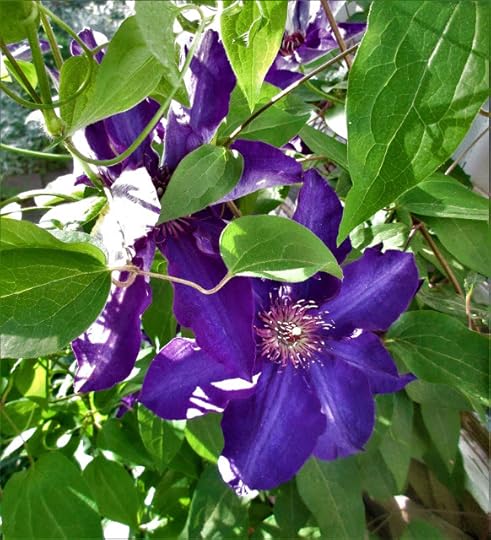
The Clematis vine climbs up our front porch. It blooms from around the third week of May through the month of June. We live Quincy, a small city that borders Boston, Mass.
Here's a poem inspired by our Clematis plant:
ClematisLooking Down at Us*
Like fallen stars
but oversized
great violet wheels descending on tame, unwary
villages below
those little folk of summer
Wagging fat limbs, like octopi
bred on a diet of purple sun
Creatures from a universe of stronger light
and the appetite of clouds
their slow motion tumble
the stopwatch of spring
*It was published by Turtle Island quarterly, back in February.
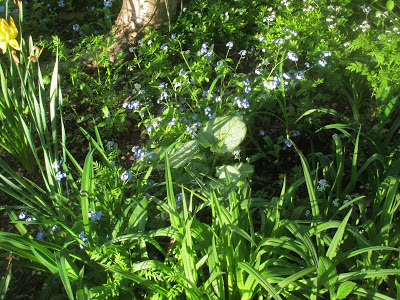
Blue Forget-Me-Not blooms under a Weeping Cherry tree. The white-blooming groundcover is Sweet Woodruff.
Robert Knox is a poet, fiction writer, and Boston Globe correspondent. As a contributing editor for the online poetry journal Verse-Virtual, his poems appear regularly on that site. They have also appeared in journals such as The American Journal of Poetry, New Verse News, Unlikely Stories, and others. His poetry chapbook "Gardeners Do It With Their Hands Dirty" was nominated for a Massachusetts Best Book award, and hHe was named the winner of the 2019 Anita McAndrews Poetry Award. A book of linked short stories, titled "House Stories," has been accepted for publication by Adelaide Press.
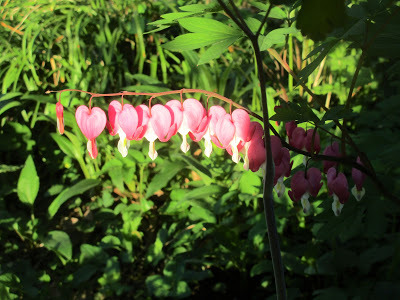
Bleeding Heart blooms in April.
The tree-form of Peony, also known as the Chinese Peony, blooms early in May. Unlike the more common Peony, the stems are wood and do not wilt or die back in winter. And its blossoms are large.
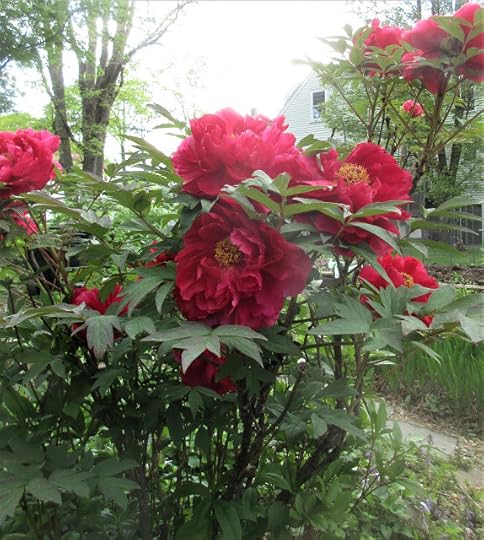
I wrote this back in 2013:
With blossoms big as your hand, the “tree peony” was voted the “unofficial national flower” of China following a nationwide vote in the nineties. In Chinese culture, red is the color of good luck. The tree peony grows taller and has more of a classic branching-out tree shape than the more common peony shrub. It has a woody trunk and branches like a tree, and you don’t trim the woody parts back And it seems to bloom earlier. I was surprised the first time it bloomed early in May. Last year it bloomed in April. This year, a cooler, slower spring, the flowers first showed on May 11. It’s hard not to stare at the blossoms if you’re nearby. They’re the neon signs in the Times Square of springtime’s Nature City.Eight years later, I'm still amazed by the blossoms every year.
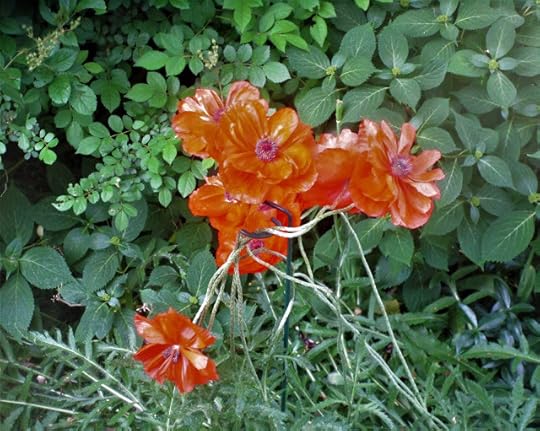
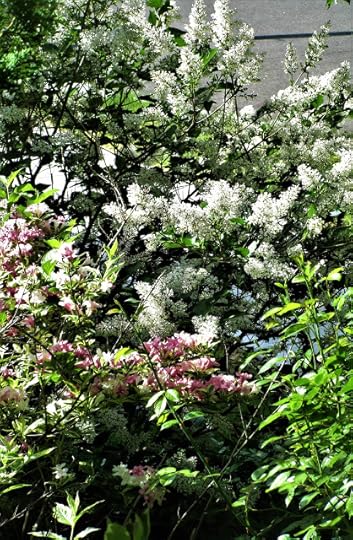
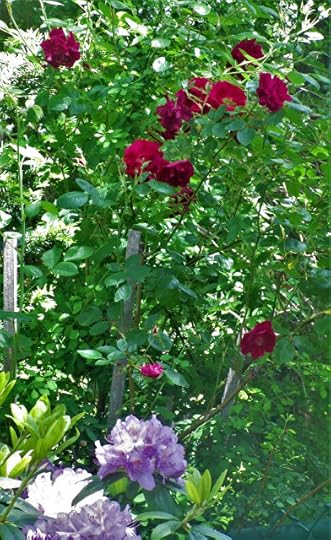
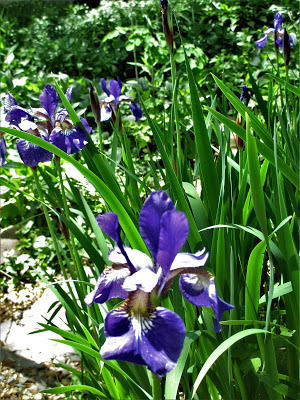 The flowers pictured, from above, are an Icelandic Poppy (orange); a Korean lilac, very pale flowers, looking white in this photo; roses blooming over a Rhododendron; and Siberian Iris, that begin opening in late May.
The flowers pictured, from above, are an Icelandic Poppy (orange); a Korean lilac, very pale flowers, looking white in this photo; roses blooming over a Rhododendron; and Siberian Iris, that begin opening in late May.May 16, 2021
Garden of the Seasons: Every Spring the World Begins Again
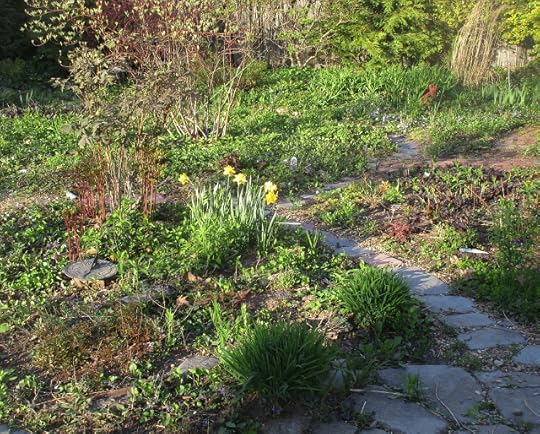
An afternoon in the first day of May
Shapes and color tones beginning to define themselves
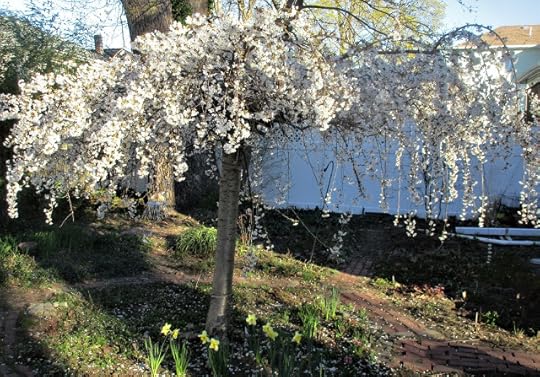
In the third week of April, the weeping cherry tree blossoms. Most of the garden in the backyard of our house in a small Massachusetts city is still waking up, though the daffodils are in bloom.
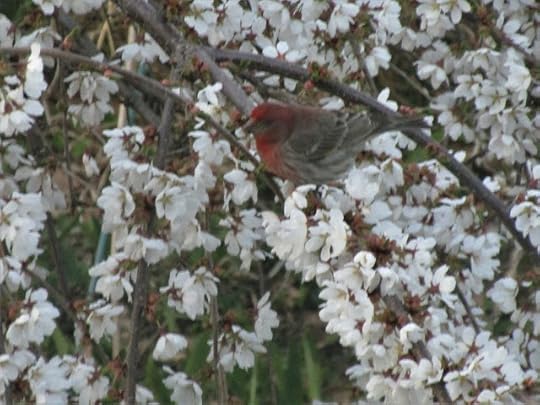
A bird or two, always a purple finch, arrives at exactly this moment to drink the nectar, a tiny drop or two, from the blossoms. To do this the bird pulls the blossom off the branch with its beak and gives it a quick toss into the air. Sometimes this causes the blossoms to fall like snow and gather beneath the tree. Fearing to see the tree denuded while still in blossom, I run outdoors and scare them away. Within a few minutes they're back.
I find the combination exquisite.These wild violets are among those I transplanted from our back garden where they emerge free for the taking every spring. Up before any of the large plants can block the sun or hog the ground, the plants flourish here along a low brick edging and in the sidewalk strip in front of our house where the only early season competition is the daffodils.
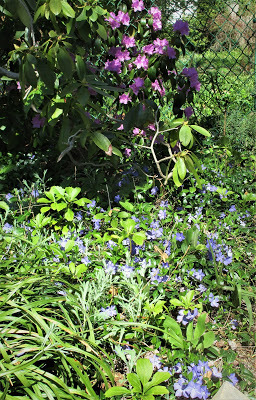
The low groundcover with blue flowers is Vinca Minor. It grows all over our gardens. We transplanted it from our previous home, and from some wooded sites in Berkshire County. The flowers are darker, more purple than they appear in this photo. Vinca spreads quickly, and found its way over to this sideyard below the rhododendrons (the smaller one is in flower), a few years back. It's perfectly at home there now.

Another late April moment from the back garden. The tall plant, not yet in flower here, is a a tree-form peony, from China. Its stems are woody and remain firm through the winters like tree trunks. Its flowers are bright red, and large. They bloom in mid-May (I'll post them next time). Violets and daffodils are the only blooms visible here in spring's first month, but the seasonal contours are forming on the ground.
May 10, 2021
The Garden of Verse: These Poems Are Blooming in May
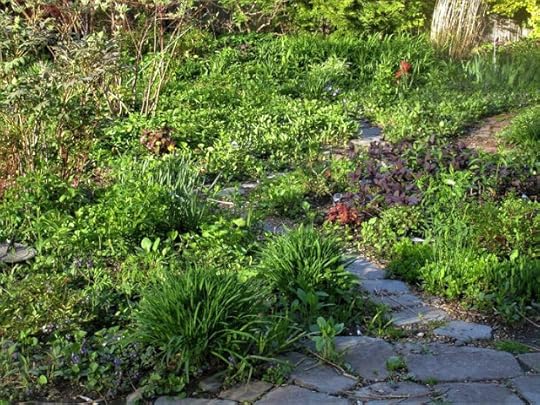
Outdoor days are back. Studies show that people feel better if they spend just twenty minutes a day outdoors. I know I feel good after spending time with plants.
“Recipe for a Curbside Strip” is an account of my efforts to keep a flower garden growing in a city by replanting the ground in front of our house after the city rebuilt our street and sidewalk.
Here's an excerpt:
Recipe for a Curbside Strip
Begin again in Thanksgiving cold,
planting scores of daffodil starters,
those fat spuds of sunny potential,
in the city's gift of much-pebbled soil
Wait five months for the bloom,
add wild violets transferred by hand from
the fertile, weed-addicting earth of the perennial patches
out back,
plus other nameless wildthings, weeds
and a prominent invasive left to its own greedy device
Chip in some new Covid-priced annuals
(everything pretty much double this year)
Then out back again to hunt up more ground-hugging
violets to fill
a few shyly embarrassed bare spots
like children with too much flesh
for last year's clothing
...
The next two poems are responses to Covid Time.
An excerpt from:
Of Course the Poet Wears a Mask
Everybody wears a mask
the fender polisher wears a mask
the metallurgist
the surgeon in his lair
to guard against the spatter
The actor with his shrewd demeanor
to take us into his confidence...
Who am I today?
the player asks
the politician with his broken staff
the weeping child
the disappointed lover
the confident despoiler
the rigger
the triggerman
...
And, finally from:
Accidental Collaborators
She turned to me, a look of distant rainbows
in her eyes
Kiss me, I said, you fool
...
To read the poems in their entirety, go to
http://verse-virtual.org/2021/May/knox-robert-2021-may.html

